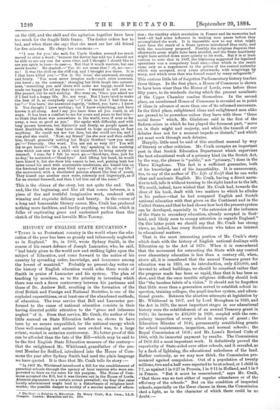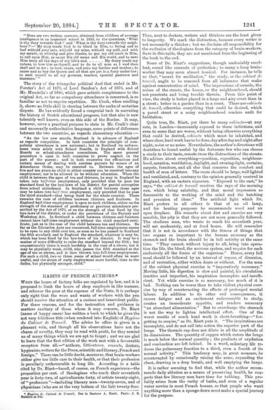HISTORY OF ENGLISH STATE EDUCATION.* 4 ' THERE is no Protestant
country in the world where the edu- cation of the poor has been so grossly and infamously neglected as in England." So, in 1806, wrote Sydney Smith, in the course of his smart defence of Joseph Lancaster, who, he said, 4‘ had lately given to the world new and striking lights upon the
subject of Education, and come forward to the notice of his eonntry by spreading order, knowledge, and innocence among the lowest of mankind." Probably no present-day writer on the history of English education would echo these words of Smith in praise of Lancaster and his system. The plan of teaching by monitors, as to the priority in inventing which there was such a fierce controversy between his partisans and those of Dr. Andrew Bell, resulting in the formation of the rival British and Foreign and National Societies, is one of the .exploded superstitions, or at least one of the abandoned methods, -of education. The true service that Bell and Lancaster per- formed to the cause of national education consists in their having directed public attention to the "gross and infamous
neglect" of it. Even that service, Mr. Craik, the author of the little manual on State Education before us, shows to have been by no means unqualified, for the national energy which these well-meaning and earnest men evoked was, to a large extent, wasted in sectarian controversy. No better proof of this can be afforded than the fate of the Bill—which may be said to be the first English State Education measure of the century— that the enlightened Mr. Whitbread, grandfather of the pre- seat Member for Bedford, introduced into the House of Com- mons the year after Sydney Smith had used the plain language we have quoted. It is thus that Mr. Craik tells its story :— "In 1807 Mr. Whitbread introduced a Bill for the establishment of parochial schools through the agency of local vestries who were em- powered to draw on the rates for the purpose. The House of Com- mons accepted the Bill, but it was thrown out in the House of Lords. Alarmist arguments to a certain extent prevailed ; the fear that rates locally administered might lead to a disturbance of religious land- marks; the possible danger to society of a secular system of educa- • The State in Rotation to Education. By Henry Grant, M.A. Oxon., LL.D. Glasgow. London: Macmillan and Co. 1584. tion ; the timidity which revolution in France and its memories had bred—all had some influence in making men pause before they accomplished the work. It is impossible now to say what might have been the result of a State system introduced thus early, and with the machinery proposed. Possibly the religious disputes that afterwards arose might have been avoided, and the State machinery might have settled down more quietly to its work. But it is at least curious to note that in 1807, the beginning suggested for legalised operations was a compulsory local rate,—that which in the result came only as a supplement to the action of the central authority which was accepted, sixty years afterwards, with misgivings by many, and which even then was fenced round by many safeguards.'
This curious little bit of forgotten Parliamentary history teaches three things. In the first place, a House of Commons is shown to have been wiser than the House of Lords, even before those fifty years, to its misdeeds during which the present assailants of the Upper Chamber confine themselves. In the second place, an unreformed House of Commons is revealed as in point of ideas in advance of more than one of its reformed successors. In the third place, enlightened ideas and enlightened men alike are proved to be powerless unless they have with them "those social forces" which, Mr. Gladstone said in the first of the Reform crises in which he has played the foremost part, "move on in their might and majesty, and which the tumult of our debates does not for a moment impede or disturb," and which yet must work through such debates.
Happily, little need be said of this excellent manual by way of literary or other criticism. Mr. Craik occupies an important post in that Scotch Education Department which supervises the best educational work of a primary kind (in the Scotch Act, by the way, the phrase is "public," not "primary,") done in the Three Kingdoms. This fact is a sufficient guarantee, both of his knowledge and of his impartiality. It is unnecessary, too, to say of the author of The Life of Swift that he can write clear and academic English. Mr. Craik, having a direct narra- tive to tell, tells it without turning to the right hand or to the left.
We could, indeed, have wished that Mr. Craik had, towards the close of his book, dealt with two matters to which he alludes in his preface—that he had compared English and Scotch national education with that given on the Continent and in the United States, and that he had shown how best the present system can be developed, especially in "the extension of the influence of the State to secondary education, already accepted in Scot- land, and likely soon to occupy attention as regards England."
On this latter point we should say that Mr. Craik has strong views, as, indeed, has every Scotchman who takes an interest in educational matters.
That is the most interesting portion of Mr. Craik's story which deals with the history of English national dealings with Education up to the Act of 1870. When it is remembered that the movement for entrusting the State with any control over elementary education is less than a century old, when, above all, it is considered that the annual Treasury grant for education was in 1833, on its introduction, only 220,000, and • devoted to school buildings, we should be surprised rather that the progress made has been so rapid, than that it has been so slow, and that the once terrible religious difficulty should look
like "the baseless fabric of a vision." It should not be forgotten that little more than a generation served to establish school in- spection, training colleges, the pupil-teacher system, and educa- tional grants. Between the abortive attempts at legislation by Mr. Whitbread in 1807, and by Lord Brougham in 1820, and the Act in 1870, the most important stages in our educational history were the establishment of an annual Treasury grant in 1833; its increase to 230,000 in 1839, coupled with the com- pulsory inspection of every school in receipt of grant ; the Education Minutes of 1846, permanently establishing grants for school maintenance, inspection, and normal schools ; the Royal Commission of 1858; and Mr. Lowe's Revised Code of 1860, with its immortal payment by results. The Commission of 1858 did a most important work. It definitively proved the superiority of State-aided over other schools, and it revealed, as by a flash of lightning, the educational nakedness of the land. Rather curiously, as we may now think, the Commission pro- nounced against compulsion. Out of a population of twenty millions, two and a half were reported to be at school, or 1 child in 7.7, as against 1 in 6-27 in Prussia, 1 in 8.11 in Holland, and 1 in 9
in France. "But it must be remembered," says Mr. Craik, "that there was no test either of regular attendance or of the efficiency of the schools." But on the condition of inspected schools, especially on the lOwer classes in them, the Commission
shed a light, as to the character of which there could be no doubt:- "Here are two written answers, obtained from children of average intelligence in an inspected school in 1855, to the questions, What is thy duty towards God r and 'What is thy duty towards thy neigh- bour ?'—' My duty toads God is to bleed in Him, to fering and to loaf withold your arts, withold my mine, withold my sold, and with my sernth, to whirchp and give thanks, to put my old trash in Him, to call upon Him, to onner His old name and His world, and to save
Him truly all the days of my life's end My dooty toads my nabers, to love him as thyself, and to do to all men as I wed thou shall and to me ; to love, onner, and suke my farther and mother ; to miner and to bay the Queen and all that are pet in a forty under her ; to omit myself to all my gooness, teaches, sportial pastures and marsters.' "
The story of the triangular political duel that ended in Mr. Forster's Act of 1870, of Lord Sandon's Act of 1876, and of Mr. Mundella's of 1880, which gave artistic completeness to the original Act, so far as compulsory attendance is concerned, is so familiar as not to require repetition. Mr. Craik, when retelling it, shows no little skill in steering between the rocks of sectarian dispute. He has evidently found a congenial task in narrating the history of Scotch educational progress, but that also is now tolerably well known, even on this side of the Border. It may, however, serve a practical purpose to state in Mr. Craik's clear and necessarily authoritative language, some points of difference between the two countries, as regards elementary education :—
"As the law now stands, Scotland is in advance of England as regards compulsion. In both countries the principle of com- pulsory attendance is now universal; but in Scotland its enforce- ment rests solely with School Boards, in England with School Boards or school-attendance committees. The same general procedure is open in both countries to prove neglect on the part of the parent ; and in both countries the efficacious and certain means of dealing with careless parents by means of an Attendance Order, may be resorted to. Between the ages of five and ten years no child in either country can be received into any employment, nor is he allowed to be without education. When the child is between the ages of ten and thirteen, he may in England be taken into halftime employment, only provided that he pass the standard fixed by the bye-laws of his district for partial exemption from school attendance. In Scotland a child between these ages may be taken into half time employment, only provided that he pass the third standard—that being fixed for the whole country. There remains the case of children between thirteen and fonrteen. In England half-time employment is open to such children, either on the strength of the standard of proficiency or previous attendance pre- scribed by the Act of 1876, or on the strength of that fixed by the bye-laws of the district, or under the provisions of the Factory and Workshop Act. In Scotland a child between thirteen and fourteen cannot have half-time employment without the third standard certi- ficate, just as in the case of the child between ten and thirteen. So far as the Education Acts are concerned, fall-time employment seems to be open to any child over ten, as soon as he has passed in Scotland the fifth standard, and in England the standard, whatever it may be, which has been fixed by the bye-laws of his district. It may be a matter of some difficulty to raise the standard beyond the fifth ; but unquestionably there is much hardship in the case of a clever, but it may be physically weak, child, who passes the fifth standard at the age of ten or eleven, and is then thrown into fall-time employment. For such a child, two or three years of school would often be more useful, and the strain of early employment more hurtful, than to the duller, but physically stronger, child."



































 Previous page
Previous page